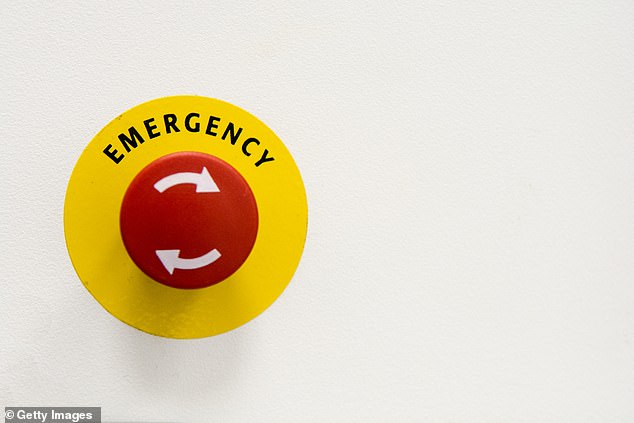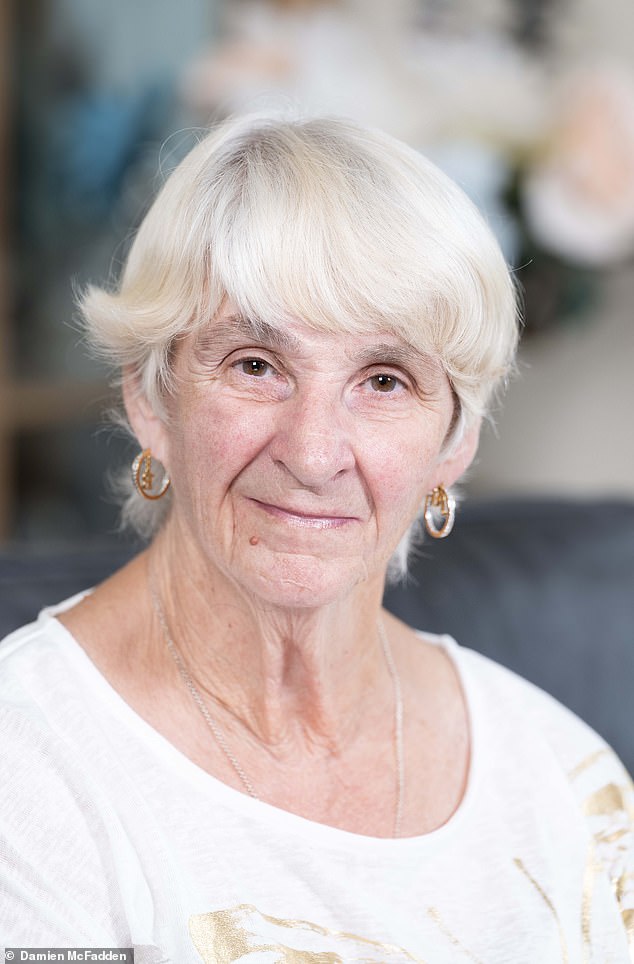People living at Mallards retirement village in Mildenhall, Suffolk, often benefited from having cords in each room that they could use to call for help in an emergency.
But when BT began switching traditional phone lines to digital in May last year, these life-saving alarms stopped working.
Residents of the 31 flats on the complex are now being asked to shell out a total of £60,000 to upgrade the alarm systems to get them working again, resulting in a bill of £1,935 per person.
BT is phasing out traditional copper phone lines and moving all its customers to digital landlines as part of its so-called Digital Voice programme.
Janice Brackenbury, 75, who lives in the Mallards development, was hit with a bill for £1,935 to fit emergency cords in her two-bedroom rented bungalow.
But the move is creating a potential crisis for up to two million people who have pendant alarms connected to emergency switches at home or worn around the neck or wrist. The alarms often stop working after BT makes a digital switch, unless they are retrofitted or replaced with new equipment.
Janice Brackenbury, 75, who lives in the Mallards complex, received a bill for £1,935 from property management company FirstPort in July to retrofit emergency cords in her two-bedroom rental bungalow.
The charge is not from BT, but from FirstPort, to pay for adaptations made following BT’s switch from traditional to digital phone lines.
This is separate from an annual service charge of £3,458 you already pay to this provider.
The Mallards complex where Janice lives is marketed as “retirement housing” and the alarm system is a key part of its appeal. When a resident pulls one of the cords, the alarm is activated and someone on-site or remotely can be contacted for help.
Unfortunately for residents like Janice, even if the health insurance system is not mandatory, it still has to be paid for as part of the agreement to live in the managed community.
Until the cord system is fixed, residents are told they must dial “999” from a landline or mobile phone if they have an out-of-hours emergency. This may be less effective as cords are strategically placed for medical emergencies while a phone may be out of reach.
Cords continue to work during the day because calls are routed directly to someone who is available to answer on site, rather than to an off-site responder using a phone line.
In a July 18 letter to residents, FirstPort said: “When the switch was completed, we discovered that the pull cord system was not connected to our after-hours emergency service providers. Our only option was a complete rewire of the system.”
The property management company says the total cost of the move is £107,000, but because money had already been set aside from previous service charge payments, the “missing amount for the project” is £60,000 plus other costs, which must be split between residents.
Janice, a retired legal secretary, said: “I was stunned when I saw the demand. No one asked for this digital change and I see no reason why we should be the ones footing the bill. I am furious that the vulnerable are being penalised.”
Janice adds: “I don’t even want these emergency lines, but I do have a mobile phone. The cost of this change is a rip-off and it’s unfair that people are forced to pay if they need vital help in an emergency.”
FirstPort would not confirm whether any of the 31,000 homes across 5,000 developments in Britain that it manages face similar charges.
A FirstPort spokesperson said: “The current system is outdated and needs replacing as a result of the transition of telephone lines from analogue to digital services across the UK. We have been consulting with homeowners on the works and are doing everything we can to keep costs as low as possible whilst maintaining the necessary services.”
Dennis Reed, from older people’s action group Silver Voices, said: ‘I’ve heard of clients being charged hundreds of pounds to switch to telecare, but this demand of nearly £2,000 is the worst.
‘Many clients took out telecare plans when they were in better physical or mental condition and demanding extra money to continue maintaining this support is a mistake.’
Charlotte Findley, from the Technology Enabled Care Services Association (TSA), said: “There is an extra cost to switching to digital technology. Around a third of telecare customers are using a private service. They may expect a service that previously cost £10 a month to rise to £20 a month due to the necessary upgrading of the technology, such as the need for new SIM cards. There may also be cases where the cost is higher where the whole system needs to be upgraded.”
Providers such as Telecare Choice charge from £124 a year to rent digital equipment, such as a health pendant or wristband with an emergency button, which is linked to a dedicated 24-hour “monitoring centre” computer for help.
Others, such as Careline365, owned by the Appello Group, charge £300 a year for a similar service plus “automatic fall detection”, where the speed of movement or impact on hitting the ground is detected by a pendant or wristband and alerts a monitoring centre.
Another drawback of digital technology is that unlike traditional phone lines, digital connections must be plugged into an electrical outlet to work, as they communicate using Voice over Internet Protocol (VoIP) technology. Therefore, in the event of a power outage, the phone and emergency service line may stop working.
BT has promised to provide back-up equipment to its vulnerable customers to ensure they are not left without service in the event of an emergency, but this does not include telecare support.
Additional help includes an £85 power pack with batteries that last at least four hours in the event of a power cut, as well as an £80 hybrid phone that can switch to a mobile reception signal if there is no power or broadband is cut off.

BT’s move is creating a potential crisis for up to two million people who have alarms linked to emergency switches in their homes.
Homeowners will not have to pay for the switch to digital phone lines and will be able to keep their old number. BT is offering customers a free £20 adapter that allows households to connect a traditional phone to an internet socket.
A BT spokesperson said: ‘There is a cost associated with making the digital switch for emergency telecare providers, but they have had to make provisions for this since 2017 so it should not come as a surprise.
‘Some suppliers will find that the kit is already compatible so there is no retrofit fee, while others decide whether to pass the cost of the upgrade on to others or cover it themselves.’
After the Money Mail and its sister paper, The Mail on Sunday, raised the alarm, BT agreed to pause the rollout of Digital Voice earlier this year for those of its 10 million customers who declare themselves vulnerable. Britain’s 30 million landline households are gradually moving to digital, a move that will be completed by the end of 2027. Unless you tell BT you are a vulnerable customer, you may be switched to digital by the end of 2025.
People aged 70 or over who are claiming disability benefit, who suffer from mental health problems or who feel confused or anxious about change can register as vulnerable. If you live in an isolated area prone to power cuts or no mobile coverage, you may also be classed as vulnerable.
Call BT on 0330 1234 150. You’ll initially be served by an automated telephone service. To explain that you’re a vulnerable customer, press “one”, “one” again, then “three”. Simply say “I’m a vulnerable customer” and then explain why you don’t want to switch.
- Are you being charged for adapting or replacing telecare equipment as part of the transition to digital technology? Email: toby.walne@dailymail.co.uk
Some links in this article may be affiliate links. If you click on them we may earn a small commission. This helps us fund This Is Money and keep it free to use. We do not write articles to promote products. We do not allow any commercial relationships to affect our editorial independence.
(tags to translate)dailymail

